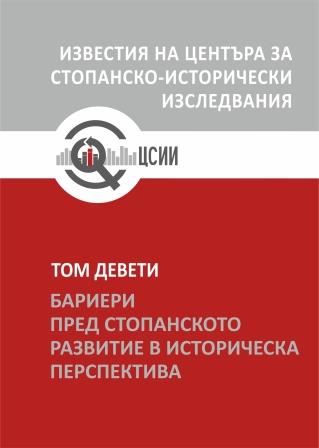Недостатъчно бедни: развитие на българското село и индустрия, 1878–1939 година
Not Enough Poor: Agricultural and Industrial Development of Bulgaria, 1878–1939
Author(s): Dimitar SabevSubject(s): History, Economy, National Economy, Agriculture, Comparative history, Economic history, Social history, Modern Age, Recent History (1900 till today), Public Finances, Socio-Economic Research
Published by: Център за стопанско-исторически изследвания
Keywords: modern economic history of Bulgaria; Bulgarian agriculture; land ownership; backwardness; self-sustaining agriculture; early coal mining; demographic pressure; middle path of development
Summary/Abstract: The prevailing perspective on the Bulgarian economy from 1878 to 1939 characterizes it as extremely backward. However, growing evidence suggests that this pessimistic assessment must be reconsidered. In 1910, Bulgaria boasted a slightly higher per capita gross domestic product than most geographically and historically similar nations. This advantage continued to expand until 1939, indicating a potential shift toward a more modern economic structure. Importantly, national income was distributed relatively equitably. The majority of Bulgarians owned sufficient arable land to sustain themselves, and this prevented them from being forced to sell cheaply their labour. This hindered industrial growth but also prevented extreme exploitation. The widespread ownership of land in Bulgaria had its roots in the Tansimat, intensified along with the emigration of Turks after 1878, and solidified by the 1920/21 land laws. As a result, three-fourths of the Bulgarian population became landowners, with about 82% of peasants owning less than 10 hectares of land. While this scale of land ownership did not guarantee high incomes, it helped prevent extreme poverty during a challenging period for the national and global economy. However, both Marxists and proponents of capitalist growth heavily criticized Bulgaria’s small-scale land ownership. Marxists viewed non-starving villages as an obstacle to the emergence of the proletariat that would spark a revolution. Advocates of capitalist growth lamented the higher labour costs and lower labour market recruitment. This paper contends that the Bulgarian village economy was a democratic economic order that emerged spontaneously, relied on the personal agency of the landowners, and effectively reduced extreme poverty, although not preventing scarcity. Until the beginning of World War II, the Bulgarian village economy followed a middle path of development that achieved a three-fold increase in literacy among village women in just one generation – without spectacularly contributing to the overall GDP figures or sparking a proletarian revolution.
Journal: Известия на Центъра за стопанско-исторически изследвания
- Issue Year: IX/2024
- Issue No: 1
- Page Range: 221-232
- Page Count: 12
- Language: Bulgarian

